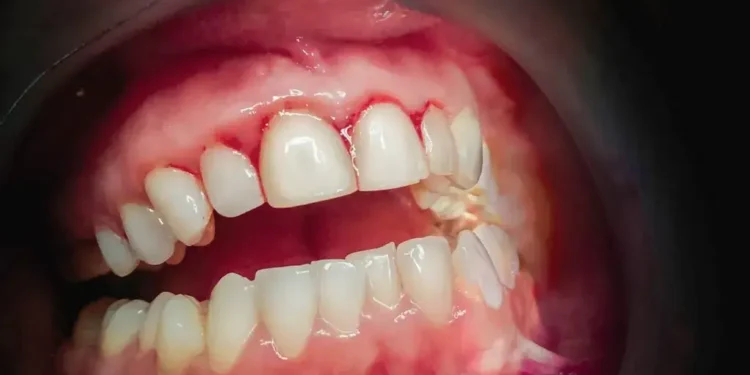Gingivitis, a mild yet concerning form of gum disease, requires careful attention and the right approach to treatment and prevention.
CUPERTINO, CALIFORNIA | NOW THEN DIGITAL — In the realm of oral health, one foe stands out – Gingivitis. A mild form of gum disease, it sparks inflammation and irritation in the gums. Delving into the root causes and recognizing its symptoms can equip us with the wisdom needed to protect our dental well-being.
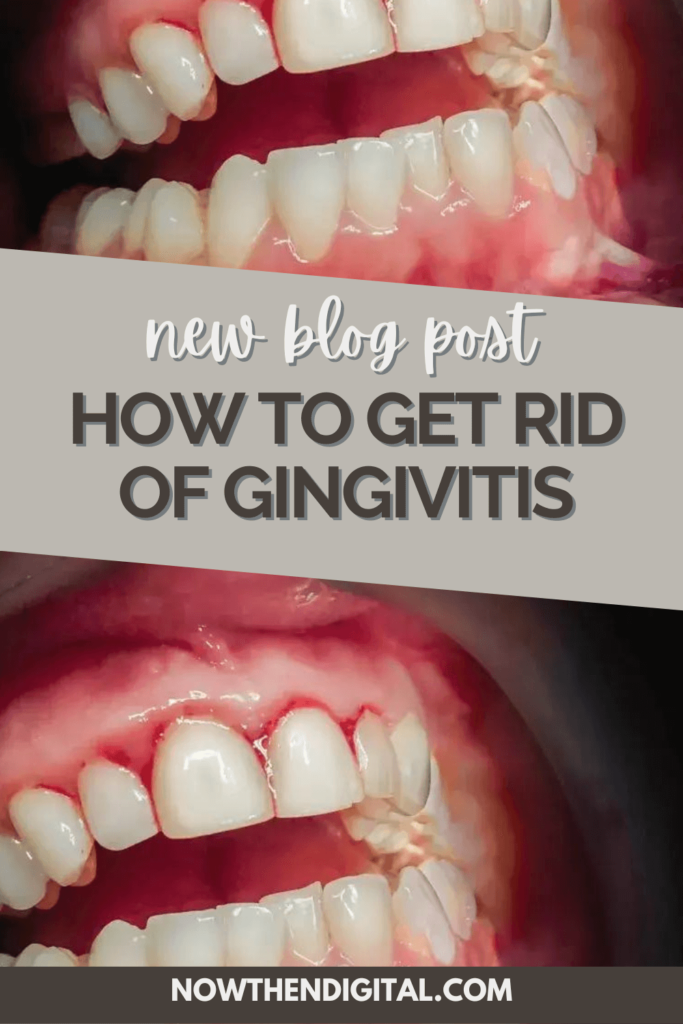
Symptoms:
Gingivitis, though mild, makes its presence felt through redness, swelling, and irritation of the gums.
Common manifestations include bleeding while brushing or flossing, receding gums, and bad breath. Sensitivity to hot or cold foods and loose teeth might also serve as telltale signs.
Treatment and Prevention:
A shield of prevention guards against the onslaught of gingivitis. Embrace the daily rituals of proper oral hygiene, employing a soft-bristle toothbrush and fluoride toothpaste for twice-daily brushing. The inclusion of daily flossing shall bolster defenses.
Regular dental checkups and professional cleanings hold the key to reversing the condition. Seek the guidance of your dentist at the earliest signs, and together, we shall fortify your smile against the clutches of gingivitis and its menacing accomplice, periodontitis.
Gingivitis, a common ailment, should not be underestimated. Adhering to good oral hygiene practices and heeding the counsel of dental professionals empower us in the battle against this adversary. By nurturing a deeper understanding of gingivitis, we safeguard our dental health and pave the path to a brighter, toothier future.
How Is Gingivitis Treated?
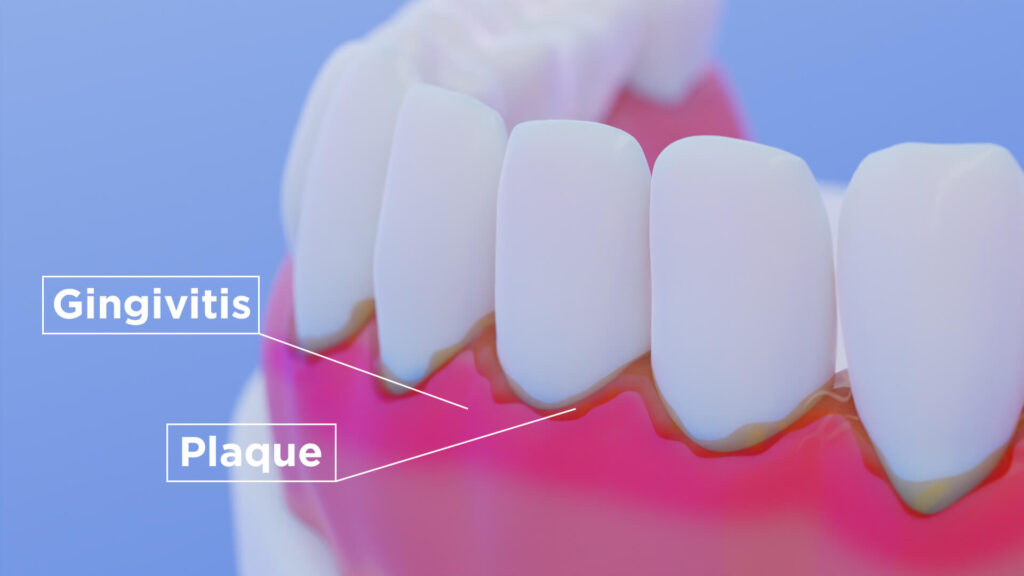
Gingivitis, a mild yet treatable form of gum disease, demands attention to ensure optimal oral health.
By understanding the diverse treatment options available, you can take charge of your gum health. Here’s what you need to know:
Professional Treatment:
Professional care is instrumental in tackling gingivitis effectively. Consider these two key treatment options:
- Scaling and Root Planing: Similar to routine dental cleaning, this procedure targets deeper gum areas. Scaling removes tartar and bacteria, while root planing smooths tooth roots, reducing bacterial adherence.
- Antibiotics: For gingivitis triggered by bacterial infections, dentists may prescribe antibiotics to eliminate harmful bacteria, promoting gum healing.
Home Remedies:
In conjunction with professional care, several home remedies can enhance your gingivitis treatment plan. Explore these options:
- Saltwater Rinse: A saltwater rinse combines 3/4 tsp of salt with lukewarm water. Swish the solution in your mouth for 20-30 seconds, repeating two or three times daily to facilitate healing.
- Oil Pulling: Promoting Devote 20-30 minutes to swishing oil in your mouth, such as coconut oil, to minimize harmful bacteria’s presence and support oral health.
- Tea Tree Oil Mouthwash: Blend a few drops of tea tree oil with water and swish the mixture in your mouth for 30 seconds before spitting it out to benefit from its antibacterial properties.
- Aloe Vera Mouthwash: Create a mouthwash by mixing aloe vera gel with water, swishing it for 30 seconds, and then spitting it out to alleviate irritated gums.
- Guava Leaf Mouthwash: Prepare a mouthwash by boiling guava leaves in water, allowing it to cool, and using it to benefit from the antimicrobial properties of guava leaves.
Prevention:
Implementing preventive measures is key to avoiding gingivitis recurrence and progression. Adhere to these essential preventive steps:
- Maintain Optimal Oral Hygiene: Brush your teeth at least twice a day, floss daily, and prioritize regular dental checkups.
- Steer Clear of Tobacco: Avoid smoking and using other tobacco products, as they exacerbate gum disease.
- Moderate Alcohol and Sugar Intake: Limit alcohol consumption and reduce sugar intake to protect your gums.
- Nourish Your Body: Follow a well-rounded diet rich in vitamin C to bolster your immune system and promote gum health.
Acting promptly is vital. Should you detect any signs or symptoms of gingivitis, scheduling a dental appointment is recommended. By seeking early care, you can reverse gingivitis damage and prevent its progression to periodontitis.
What Are the Risk Factors for Developing Gingivitis
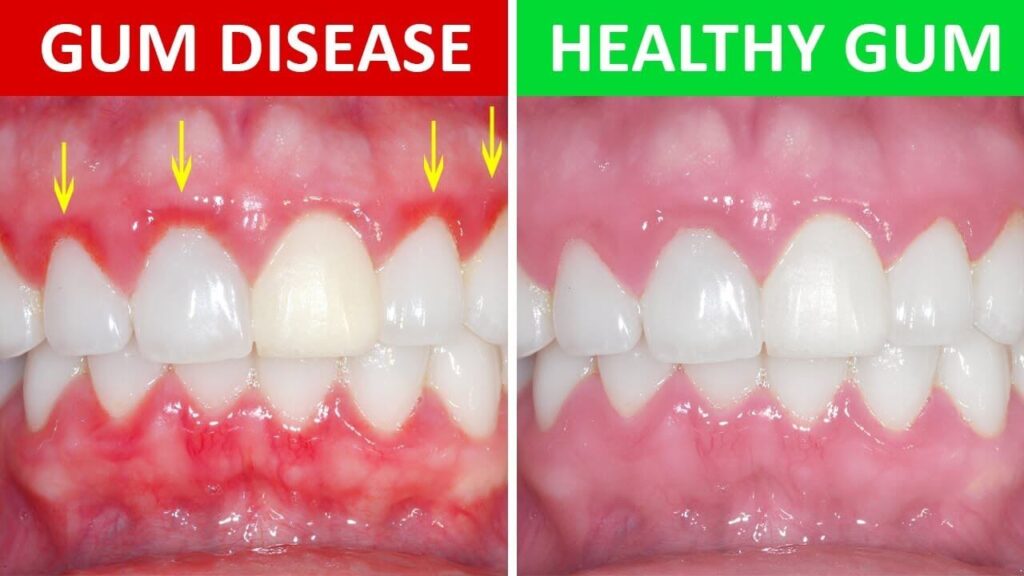
Gingivitis, the insidious precursor to more severe gum disease, poses a grave danger to your oral health. Ignoring it could lead to irreversible damage.
Stay informed and protect your smile by understanding the risk factors that contribute to the development of gingivitis:
- Neglected Oral Care: Ditching regular brushing and flossing allows plaque to thrive, leading to inflamed gums.
- Tobacco Use: Smoking or chewing tobacco puts you at higher risk for gum disease, a dangerous consequence of this habit.
- Aging Challenges: Studies indicate that older individuals face the highest rates of periodontal disease, affecting over 70% of Americans aged 65 and older.
- Dry Mouth Troubles: Insufficient saliva increases the vulnerability to gum disease as it fails to wash away food particles and neutralize bacteria.
- Nutritional Deficiencies: Inadequate vitamin C intake contributes to the severity of gingivitis and periodontal diseases, potentially leading to scurvy, characterized by bleeding gums and weakened tooth support.
- Genetic Susceptibility: Despite diligent oral care, some individuals may be more prone to developing gum disease due to genetic factors.
- Stress Overload: Weakened immune systems caused by stress pave the way for harmful bacteria to wreak havoc on gums.
- Teeth Grinding: Bruxism, the involuntary grinding or clenching of teeth, can deepen periodontal pockets and intensify gum vulnerability.
- Diabetes Complications: People with diabetes face a higher risk of infections, including gum disease.
- Medication Side Effects: Certain medications reduce saliva flow, resulting in dry mouth and an increased risk of gum disease.
The consequences of unchecked gingivitis reach beyond oral health. Dr. Kami Hoss, a dentist in Southern California, explains, “Oral microbes or their toxins can enter the bloodstream through bleeding gums, leading to infections or inflammatory responses in various parts of the body, such as the heart, lungs, brain, joints, or even unborn babies.”
Detecting gingivitis early is challenging without professional guidance. Dr. Chris Richardson, president of the American Academy of Periodontology, emphasizes the importance of regular dental visits, advising a biannual frequency.
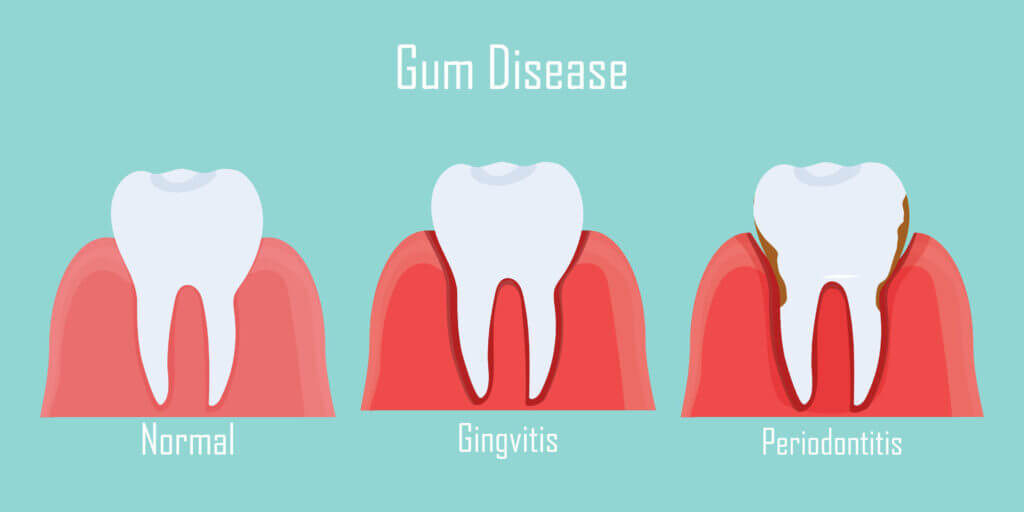
If you possess one or more of these risk factors, prioritize your oral health. Commit to impeccable oral care habits: brush twice daily, floss diligently, and schedule regular dental checkups.
By taking prompt action and seeking dental care at the first signs of gingivitis, you enhance your chances of reversing damage and preventing its progression to periodontitis.
Remember, your smile deserves the utmost care and protection.
Editor’s Note: Please contact press@nowthendigital.com if you find any of the content to be inaccurate or outdated.


